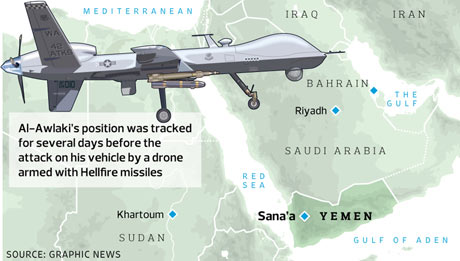By Adom M. Cooper
Impunity Watch Reporter, Middle East
SANAA, Yemen–Yemen’s defense ministry reported that Anwar al-Awlaki, a prevalent and controversial imam allegedly linked to al-Qaeda, was killed on Friday 30 September along with four other individuals. Tribal sources reported to the AFP news agency that al-Awlaki was killed early on Friday in an air raid that crushed two vehicles travelling through an al-Qaeda stronghold in central Yemen.

The 40- year-old U.S.-born al-Awlaki was a father of five children. Government officials reported that al-Awlaki was targeted 8km (approximately 4.97 miles) from the town of Khashef in the province of al-Jawf. Khasef is located just 140km (approximately 86.99 miles) from the capital of Yemen, Sanaa.
Another U.S. citizen, Samir Kahn, was also killed in the air raid. Kahn was the co-editor of al-Qaeda’s Inspire magazine, a specialist in computer programming, and was also wanted by the American and Yemeni authorities.
U.S. President Barack Obama said the killing of al-Awlaki was a “significant milestone in the broader effort to defeat al-Qaeda and its affiliates.”
“[A]l-Awlaki repeatedly called on individuals in the United States and around the globe to kill innocent men, women, and children to advance a murderous agenda.”
The aircraft that carried out the mission to eliminate al-Awlaki was probably American, according to tribal sources. American aircraft had been patrolling the skies over Marib, a central Yemeni province, for the past several days.
Al-Awlaki had been targeted for quite some time. In May 2011, a U.S. drone aircraft targeted him but missed its mark. In July 2010, the Obama Administration placed al-Awlaki on its list of terrorism supporters, freezing his financial assets and banning any transactions made with him. On 24 December 2010, the Yemeni defense ministry had announced his death, saying that he had been killed in an air attack, only to admit later that he was still alive.
Hakim al-Masmari, the editor-in-chief of the Yemeni Post, shared these sentiments with Al-Jazeera about the targeting of al-Awlaki.
“He has been a target of US drones at least three times. The Yemeni government will face a lot of criticism, especially in the south, for allowing US drones to attack Yemeni civilians. But it will not be a blow to al-Qaeda in the Arabian Peninsula from any perspective. We don’t feel they will suffer because al-Awlaki did not have any real role in al-Qaeda in the Arabian Peninsula (AQAP).”
U.S. President Obama’s counterterrorism advisor John Brennan has directly accused al-Awlaki of having links with Major Nidal Hassan. Hassan is suspected of shooting dead 13 people at Fort Hood military base in Texas in November 2009. Hassan is set to face a trial in a military court on 5 March 2012.
Also, according to Brennan, al-Awlaki may have had contact with Umar Farouk Abdulmutallab, the Nigerian student accused of attempting to blow up a Detroit-bound aircraft on Christmas 2009. In a video posted on websites in May 2010 by AQAP, al-Awlaki urged Muslims serving in the U.S. military to follow Hassan’s example and defended Abdulmutallab’s actions.
While the death of al-Awlaki may be considered a U.S. victory in the War on Terror, the legality of the action has not been settled at all.
The Center for Constitutional Rights (CCR), which had previously brought a challenge in federal court to the legality of the authorization to initially target al-Awlaki in Yemen, condemned the killing and called into question the existence of such practices. The organization’s media office released the following statement on 30 September, the same day the killing was reported.
“The assassination of Anwar al-Awlaki by American drone attacks is the latest of many affronts to domestic and international law. The targeted assassination program that started under President Bush and expanded under the Obama Administration essentially grants the executive the power to kill any U.S. citizen deemed a threat, without any judicial oversight, or any of the rights afforded by our Constitution. If we allow such gross overreaches of power to continue, we are setting the stage for increasing erosions of civil liberties and the rule of the law. ”
In addition, Pardiss Kebriaei, a CCR senior staff attorney, shared these words in addition to the general statement.
“In dismissing our complaint, the district court noted that there were nonetheless ‘disturbing questions’ raised by the authority being asserted by the United States. There certainly are disturbing questions that need to be asked again, and answered by the U.S. government about the circumstances of the killing and the legal standard that governed it.”
The news of al-Awlaki’s death comes amongst daily reports of new violence in Yemen. The impoverished Arabian Peninsula country has witnessed demonstrators staging protests, demanding the resignation of President Ali Abdullah Saleh. President Saleh has been in power since 1978.
For more information, please see:
Ahram – Killing of American in Yemen Raises Legal Questions – 1 October 2011
BBC – Anwar al-Awlaki Killing Sparks US Travel Alert – 1 October 2011
The Guardian – How US Tracked Anwar al-Awlaki to His Death in Yemen – 1 October 2011
Al-Jazeera – Anwar al-Awlaki Killed in Yemen – 30 September 2011
Washington Post – Anwar al-Aulaqi, U.S.-Born Cleric Linked to al-Qaeda, Killed in Yemen – 30 September 2011
Center for Constitutional Rights – CCR Condemns Targeted Assassination of U.S. Citizen Anwar Al-Awlaki – 30 September 2011
NYT – Two-Year Manhunt Led to Killing of Awlaki in Yemen – 30 September 2011